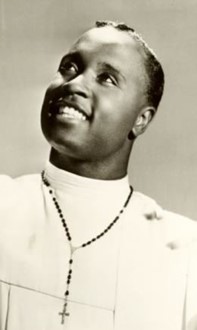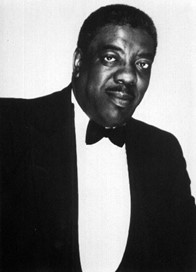
Performers of Gospel Music and Their Techniques: Solo 4

Alex Bradford
Alex Bradford (1926-1978), singer, pianist, composer, arranger, and choir director, was born in Bessemer, Alabama. Though actively engaged at a young age in music in Alabama, it was his move to Chicago 21 years later where his career as a professional was nurtured. It was here where he came in contact with some of the great gospel artists such as Mahalia Jackson and Sallie Martin. Soon afterward he created his own groups such as the Bradford Singers and the all-male Bradford Specials. In 1953 he recorded what was to become his signature song, "Too Close to Heaven," which sold over a million copies. His performance and music arrangement skills were what many believed captured the fervor of gospel music, as evidenced by his group's, Alex Bradford and the Bradford Singers, appearance in Langston Hughes's gospel play Black Nativity in 1961 (the story of Christ, but with an all-Black cast).
Though he had a relatively short life, Alex Bradford has left a significant body of recordings that exemplify gospel music during its golden age. His dedication and attention to performer and song excellence as shown in the video below places him among the great gospel performers of all time.

Alex Bradford - close to Thee [ 00:00-00:00 ]
James Cleveland (1931-1991), singer, pianist, composer, arranger, and choir director was born in Chicago, Illinois, and at some point, moved into the home of Reverend C. L. Franklin, where he taught nine-year-old Aretha Franklin to sing gospel music. Many of his accomplishments occurred during the time of the contemporary gospel, from the 1970s to the present. However, his experiences with notable golden age performers such as Albertina Walker, the Caravans, Shirley Caesar, and others provided a nurturing spirit and attitude akin to gospel music artists from the 1940s-1960s, and thus Cleveland is included here. (He will also be discussed in a later lesson on the contemporary gospel.) According to Cleveland himself, his greatest accomplishment is the creation of the Gospel Music Workshop of America (GMWA), which had its first workshop in 1968. "Under his leadership, the GMWA provided an institutional space in which Black gospel artists could hone their craft, showcase their latest work, exercise a greater degree of autonomy over the marketing of their art, and fellowship with like-minded musicians who shared their religious convictions and commitments" (Harold 2017, 159).

James Cleveland
Beginning with only a few vocalists and instrumentalists, it has grown to over 200 chapters with over 20,000 members. Other accomplishments include his "...work with Detroit's Voices of Tabernacle, the Angelic Choir of Nutley, New Jersey, and his own Southern California Community Choir," which "resulted in some of the most critically acclaimed and commercially successful recordings in gospel music history" (Harold 2017, 158). Finally, some of his most noted songs include "Lord Do It," "Peace Be Still," and "Everything Will Be Alright." His work with Aretha Franklin and particularly his contribution to her live gospel album Amazing Grace (released in 1972), and ensuing video recording, released forty-seven years later, of the same name documents this historic event.
Many solo performers also formed their groups, such as The Clara Ward Singers, Alex Bradford and The Bradford Singers, Marion Williams and The Marion Williams Singers, and Bessie Griffin and The Gospel Pearls. We will discuss groups later in this lesson.
Bessie Griffin, to some, sounded very similar to Mahalia Jackson. Take, for instance, this live video of her singing Deep River:"

Bessie Griffin & The Gospel Pearls - "Deep River" (1962) [ 00:00-00:00 ]
However, when carefully listening to both, the astute listener can spot some differences. For example, Griffin uses less of her chest voice than Jackson, which doesn't mean that she rarely uses her chest voice and the full-throated sound production. Still, there is more evenness between her different vocal sounds (listen to "My God Can Do Everything"). However, her use of the chest voice creates a dramatic contrast to emphasize lyrical meanings. In the song "He Doeth All Things Well," the use of chords not necessarily typical for Gospel causes the singer to sing more theatrically.
It's a Highway to Heaven
It's a highway to heaven
None can walk up there
But the pure in heart
It's a highway to heaven
Walking up the king's highway
Precious Lord
Through the storm, through the night
Lead me on to the light
Take my hand precious Lord, lead me home





